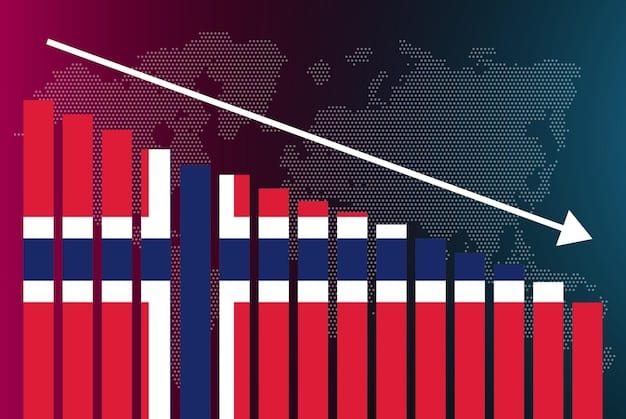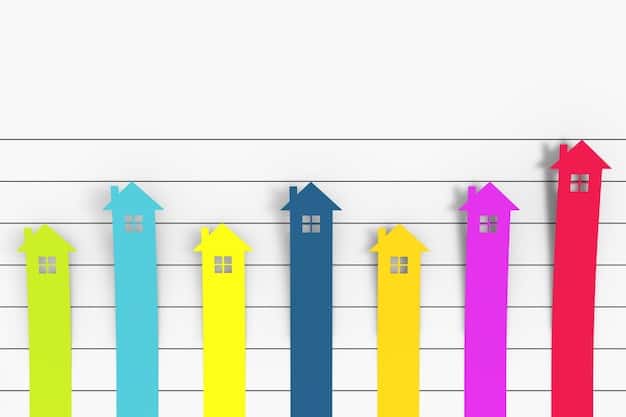Bank of England Holds Rates: What’s Next for UK Borrowers?

Anúncios
The Bank of England has maintained the base interest rate at 5.25%, pausing after a series of increases; this decision impacts mortgage rates, savings accounts, and the overall cost of borrowing for individuals and businesses across the UK.
The Breaking: Bank of England Holds Interest Rates at 5.25% – What’s Next for Borrowers? is a question on many people’s minds in the UK. After a period of consistent increases, the Bank of England has decided to hold steady. But what does this decision mean for your wallet?
Anúncios
Bank of England’s Decision: A Detailed Look
The Bank of England’s Monetary Policy Committee (MPC) has voted to maintain the base interest rate at 5.25%. This decision follows a period of significant inflation and subsequent rate hikes aimed at curbing rising prices. Understanding the factors that influenced this decision is crucial for predicting future economic trends and their impact on borrowers.
Anúncios
Factors Influencing the Rate Hold
Several key economic indicators and global factors contribute to the MPC’s decisions. Here are some of the most important:
- Inflation Rate: The current inflation rate is a primary concern. While it has decreased from its peak, it remains above the Bank of England’s target of 2%.
- Economic Growth: The UK economy’s growth rate is sluggish, with concerns about a potential recession. Holding rates steady aims to avoid further stifling economic activity.
- Global Economic Conditions: International economic developments, including the performance of major economies and geopolitical events, influence the UK’s monetary policy.
Historical Context
To fully appreciate the significance of this decision, it’s helpful to look back at recent months. The Bank of England has been steadily raising interest rates to combat inflation. Each increase has had ripple effects throughout the economy, impacting everything from mortgage rates to business investments. This hold suggests a shift in strategy, perhaps to assess the impact of previous rate hikes.

Ultimately, the Bank of England’s decision reflects a delicate balancing act between controlling inflation and supporting economic growth. Monitoring future announcements and economic data will be essential for understanding the long-term implications.
Impact on Mortgage Holders
For homeowners with mortgages, the Bank of England’s decision brings a mix of relief and uncertainty. Those with fixed-rate mortgages are unlikely to see immediate changes, but those with variable-rate mortgages may experience some reprieve. The broader implications for the housing market are also significant.
Fixed vs. Variable Rate Mortgages
The impact of the interest rate hold depends largely on the type of mortgage a homeowner has:
- Fixed-Rate Mortgages: These mortgages have a set interest rate for a specific period (e.g., 2, 5, or 10 years). Homeowners with fixed-rate mortgages will not see immediate changes in their monthly payments.
- Variable-Rate Mortgages: These mortgages have interest rates that fluctuate with the Bank of England’s base rate or other benchmark rates. A hold in interest rates provides stability for these homeowners.
- Tracker Mortgages: A type of variable-rate mortgage, tracker mortgages directly follow the Bank of England’s base rate. A pause in rate hikes means these mortgage holders won’t see their payments increase immediately.
Housing Market Considerations
The housing market is closely tied to interest rates. Higher rates tend to cool the market by making mortgages more expensive, reducing demand, and potentially leading to price drops. Conversely, stable or lower rates can stimulate the market.
The effects of interest rates goes beyond residential mortgages, the commercial business mortgage markets can take influence through changes in business investments.

Savings Accounts and Investments
The Bank of England’s decision also impacts savers and investors. While holding rates steady may not provide immediate increases in savings rates, it offers a sense of stability. Investment strategies may need to be adjusted to reflect the current economic environment.
Savings Account Rates
Interest rates on savings accounts tend to mirror the Bank of England’s base rate. When the base rate rises, savings rates typically follow, and vice versa. With the rate held steady, savers may not see substantial increases in their returns.
- Easy Access Accounts: These accounts offer flexibility and immediate access to funds. Interest rates are usually lower compared to fixed-term deposits.
- Fixed-Term Deposits: These accounts require savers to lock in their funds for a specific period in exchange for a higher interest rate.
- Notice Accounts: These accounts require savers to give a notice period before withdrawing funds, often offering slightly better interest rates than easy access accounts.
Investment Considerations
Investors must consider the impacts of fixed interest rates when making their financial choices. Investment strategies are vital as you navigate through an uncertain economic environment.
The choice and direction that you ultimately decide to take will depend on an investor’s risk tolerance, time horizon, and financial goals. A well-diversified portfolio along with professional assistance will protect and steer investment decisions.
Expert Opinions and Forecasts
Financial experts and economists offer varying perspectives on the Bank of England’s decision. Their insights can provide valuable guidance for individuals and businesses navigating the current economic climate. Understanding different viewpoints can help inform financial planning and decision-making.
Economic Forecasts
Economic forecasts are crucial for understanding the potential trajectory of the UK economy. Institutions like the Bank of England, the Office for Budget Responsibility (OBR), and various financial firms regularly publish forecasts that project future economic growth, inflation rates, and unemployment levels.
Expert Opinions
Expert opinions on the Bank of England’s decision vary, reflecting different interpretations of economic data and potential outcomes:
- Some experts believe that holding rates steady is a prudent move to avoid exacerbating economic slowdown, while others argue that further rate hikes are necessary to curb inflation effectively.
- Investment strategists often provide insights on how the Bank of England’s decisions may affect various asset classes, such as stocks, bonds, and real estate.
- Economists focus on the broader implications for the UK’s economic stability and long-term growth prospects.
Government Policies and Economic Outlook
Government policies play a crucial role in shaping the economic landscape. Fiscal measures, such as tax policies and government spending, can influence inflation, economic growth, and employment rates. Understanding the interplay between monetary policy (managed by the Bank of England) and fiscal policy (managed by the government) is essential for assessing the overall economic outlook.
Government Fiscal Policies
Government financial policies encompass various strategies that influence the monetary condition of a country. These actions significantly have an impact on key factors such as inflation, employment and the overall economic performance of a nation
Future Economic Trends
To have a grasp on the trajectory of economic improvements, it is necessary to check key forecasts and evaluations by financial experts. These predictions and analyses offers vital information on the potential path of the UK economy, advising people on what actions to take. Staying informed about these types of things will assist with any future concerns.
Strategies for Borrowers in the Current Climate
Given the current economic uncertainties, borrowers can take proactive steps to manage their finances effectively. Strategies include assessing mortgage options, managing debt, and seeking financial advice. Making informed decisions can help borrowers navigate the challenges and opportunities presented by the Bank of England’s decision.
- Review your mortgage. See if you qualify for any type of switch or restructure that may save you some money for you and your family,
- Manage all current debt. Have a budget plan in place to ensure that you tackle your finances as quickly as possible.
- Check out some incentives. Talk and connect with professional financial advice people to keep you on top of current markets
Here are some strategies that you may consider.
- Assess your mortgage options.
- Consider professional financial advice to guide you in the future
- Manage your debt repayment responsibly
- Consider other sources of income that may ease concerns with your budgeting
| Key Point | Brief Description |
|---|---|
| 🏠 Mortgage Rates | Fixed rates unaffected, variable rates may stabilise. |
| 💰 Savings Accounts | Savings rates unlikely to rise significantly soon. |
| 📈 Economic Growth | Decision aims to balance inflation and growth. |
| 🏦 Policy Outlook | Monitoring inflation and global factors crucial. |
Frequently Asked Questions
▼
The Bank of England’s current base rate is 5.25%, maintained after a series of increases aimed at curbing inflation.
▼
If you have a fixed-rate mortgage, your payments won’t change. If you have a variable-rate mortgage, your payments may stabilise.
▼
Savings account rates are unlikely to increase significantly with the base rate held steady.
▼
The Bank of England’s inflation target is 2%. The current inflation rate remains above this target.
▼
You can seek financial advice from independent financial advisors, banks, and online resources like the Money Advice Service.
Conclusion
The Bank of England’s decision to hold interest rates at 5.25% marks a significant moment for borrowers and the wider UK economy. While it brings a sense of stability, ongoing monitoring of economic data and expert advice remains crucial for navigating the future financial landscape.





